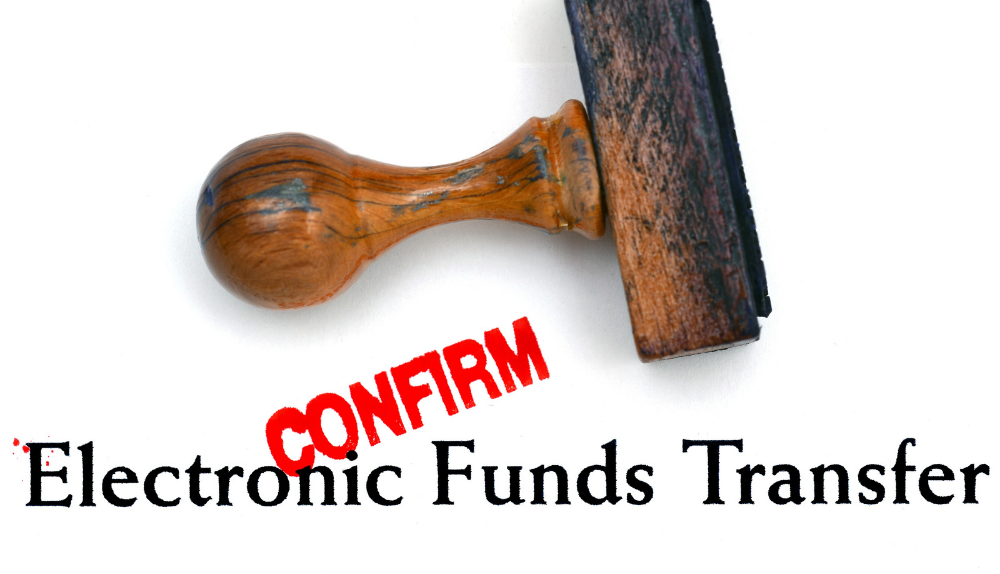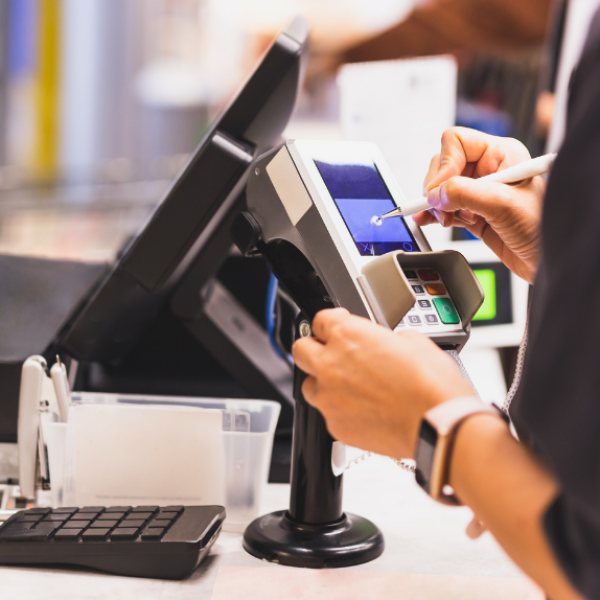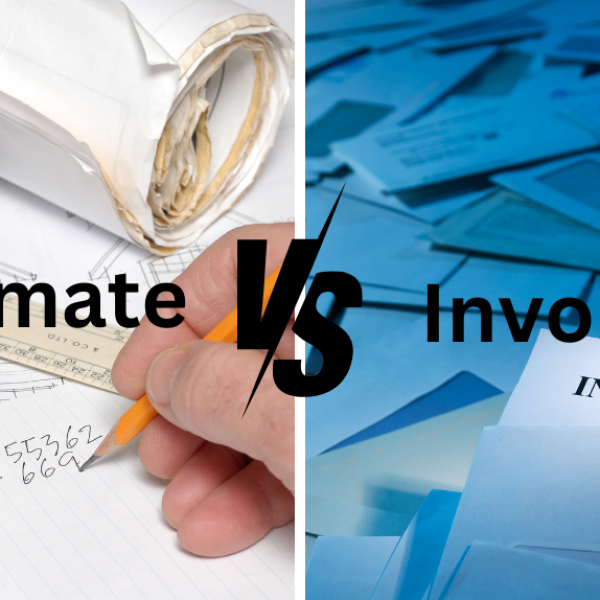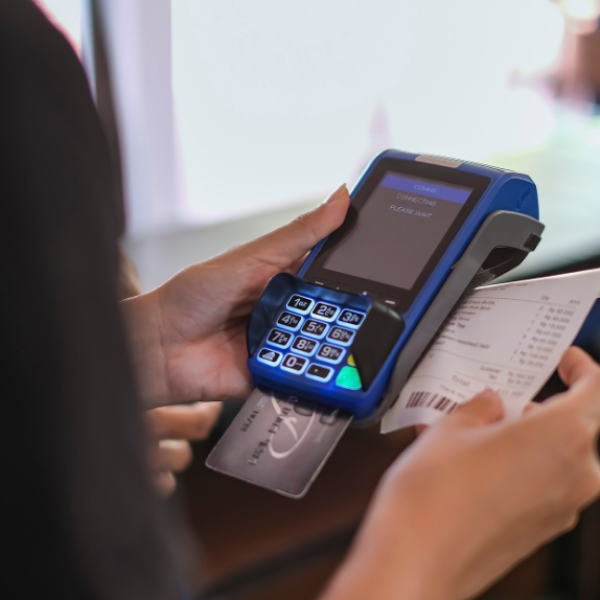Payment processing is the lifeblood of your hotel business. Without it, your existence would be in question. Plus, the methods and technology you employ for payment processing could determine whether your guests have a stellar or disappointing experience.
Understanding hotel payment processing, along with the available services and technology, is essential. It ensures a positive guest experience, safeguards against fraud, and maintains compliance.
Given the ever-changing consumer demands, staying abreast of the latest best practices, rules, and regulations is paramount. Without a robust payment processing system, your ability to serve guests and boost revenue would be severely hampered. In this article, we’ll delve into how hotel payment processing functions and highlight several key reasons why it’s indispensable within your property management system.
In This Article
ToggleWhat Is Hotel Payment Processing?

Payment processing solutions are essential tools designed to streamline electronic transactions in the hospitality sector. They smooth processes at several touchpoints, such as check-in counters, restaurants, and mobile service locations, by securely capturing and transmitting payment details.
Terminals for these solutions are installed at restaurant front desks, hotel front desks, and other service locations. Point-of-system POS terminals safely process credit and debit card transactions, net banking, and UPI payments, guaranteeing a seamless and speedy experience for both employees and visitors.
As the electronic intermediary between customers and merchants, they offer convenience through effective and safe payment systems. They are often provided in three formats: online payment solutions, mobile card readers, and payment terminals.
These solutions can also be integrated with your current systems, including the booking engine, restaurant point of sale, channel manager, and hotel property management system (PMS). Your payments are streamlined by this integration, which also maintains current records and reports.
How Does Hotel Payment Processing Work?

Hotel payment processing works through a streamlined and integrated system that involves several key players and technologies, ensuring secure and efficient transactions. Here’s how it typically works:
- Transaction Initiation: When a guest decides to pay, whether in-person, online, or through a mobile app, the payment information is captured via a POS system or a payment gateway.
- Authorization Request: The payment gateway forwards the credit or debit card details to the payment processor, which sends an authorization request to the cardholder’s issuing bank through a payment network like Visa or MasterCard.
- Authorization Response: The issuing bank verifies the transaction details, checks the account’s availability of funds, and sends back an authorization response. This response indicates whether the transaction is approved or declined.
- Payment Settlement: Once authorized, the funds are transferred from the guest’s bank to the hotel’s merchant account. This process may involve several steps, including batch settlements, where transactions are processed in groups at specified intervals.
- Payment Confirmation: The hotel then issues a receipt to the guest, confirming the transaction.
In addition to these steps, the system incorporates various security measures to protect sensitive information. Payment processors and gateways use encryption and tokenization to ensure data security, complying with standards such as PCI DSS to safeguard against fraud and data breaches.
Components of an Effective Hotel Payment Processing System
Now that we’ve begun exploring hotel payment processing let’s take a closer look at its key components.
Point of Sale (POS) Systems:
POS systems in hotels are sophisticated platforms for processing payments directly with guests. These systems offer a range of functionalities beyond simply handling payments; they can calculate sales tax, manage inventory, and apply discounts. They are primarily used for face-to-face transactions, where guests make payments by swiping, tapping, or inserting a credit card into devices around the hotel.
Online Payment Gateways:
Online payment gateways are crucial for processing transactions over the Internet. They safely relay credit card details from the hotel’s booking system to the relevant card network and issuing bank.
This is particularly important for transactions where the card is not physically present, such as when a reservation is made online. Guests enter their credit card details via the hotel’s website or a third-party booking platform. The gateway ensures that this information is handled securely, in compliance with PCI DSS standards, to safeguard the hotel and its guests from potential fraud.
Credit Card Terminals:
Credit card terminals offer a traditional method for handling hotel payments. Guests insert, tap, or swipe their debit or credit cards to complete transactions.
Mobile Card Readers:
Mobile card readers empower hotels to accept payments while on the move. These devices wirelessly connect to smartphones and facilitate transactions through specialized apps.
Property Management Systems (PMS):
An integrated Property Management System (PMS) is specialized software designed to streamline and automate hotel operations. While it encompasses various features, its ability to integrate with your POS system sets it apart.
This integration allows you to manage billing and payments throughout the hotel efficiently, accept multiple payment methods, automatically update transaction data, and provide guests with a safer, more secure payment experience.
Who are the Main Participants in Hotel Payment Processing?
In addition to guests and hoteliers, there are several key players involved in processing a typical credit card payment:
- The issuing bank: The guest’s bank issued the credit card. It is responsible for approving or declining transactions and initiating payment transfers.
- The acquiring bank: Also known as the merchant’s bank, this institution receives funds from the issuing bank and deposits them into the hotel’s account.
- The payment network: These intermediaries, such as Visa, Mastercard, American Express, and Discover, facilitate communication between the issuing and acquiring banks. Regional players like Alipay and WeChat in China and e-wallets such as Apple Pay and Google Pay are also significant.
- The payment processor provides the hardware and software to process transactions and manage fund transfers.
- The payment gateway: This service collects and securely transmits credit card data to the payment processor for online transactions.
Companies like Square, PayPal, and Stripe serve dual roles as payment processors and gateways. In the hotel sector, tech companies like Cloudbeds also perform these functions, helping hotels reduce costs and eliminate the need for a separate merchant bank account.
What are the Benefits of Hotel Payment Processing
Here are some of the benefits of a hotel payment processing solution:
Security and Fraud Prevention Measures
An effective hotel payment system prioritizes security, incorporating advanced strategies to safeguard sensitive guest information. It utilizes encryption protocols to secure payment data during transmission, effectively preventing unauthorized access by hackers.
Additionally, tokenization replaces actual cardholder details with unique identifiers, enhancing data protection. Compliance with the Payment Card Industry Data Security Standard (PCI DSS) is crucial, ensuring the system meets universal security norms.
Seamless Integration with Existing Hotel Systems
It is vital for the hotel to seamlessly integrate with its existing infrastructure, such as the Property Management System (PMS), online booking engine, and POS systems. A well-integrated payment system enables real-time updates on room availability, automates billing processes, and synchronizes data across different platforms, reducing manual errors and data entry redundancy.
Diverse Payment Options for Guests
To accommodate individual preferences, an optimal hotel payment system offers a variety of payment methods.
These include credit and debit cards, mobile payments, digital wallets, and other alternative methods, allowing guests to choose the most convenient payment method. Multiple payment options improve the guest experience and foster loyalty and repeat visits.
Flexibility in Managing Various Transaction Types
Hotels deal with a range of transaction types beyond simple room bookings. An adaptable payment system should handle different transactions smoothly, including room reservations, deposit and pre-authorizations, split payments among several guests, and efficiently processing refunds and cancellations. Such flexibility ensures a seamless transaction experience for both guests and hotel staff.
Best Payment Gateways for Hotels in 2024
Choosing the right payment gateway for your hotel requires carefully considering the options available. Here’s an in-depth look at some of the top payment gateways:
- PayPal
Internationally recognized, PayPal offers a versatile and secure platform ideal for hotels of any size. It’s known for its user-friendly interface and high acceptance rate, making it a favorite among international guests. While it integrates well with various booking platforms, it may lack specific features tailored for the hospitality sector.
- Stripe
Stripe is celebrated for its developer-oriented features, making it perfect for hotels prioritizing scalability and customization. It offers seamless integration with multiple systems and a solid payment processing infrastructure.
- Square
Square is known for its straightforward approach, making it an excellent option for small to medium-sized hotels. It is favored for its transparent pricing and simple operation, appealing particularly to businesses new to digital payments.
- Authorize.Net
As a well-established and reliable payment gateway, Authorize.Net is noted for its strong security measures and flexible integration capabilities. It has a long-standing reputation for reliably serving a variety of industries.
How To Select the Right Payment Processor for a Hotel?
Choosing the appropriate payment gateway is crucial for your hotel, as it significantly influences guest satisfaction and operational efficiency. Here are several key aspects to consider to ensure you select a payment gateway that meets the specific needs of your property:
- Understanding Your Hotel’s Specific Needs:
Before beginning the selection process, it is crucial to evaluate your hotel’s unique requirements. Consider aspects like the size of your property, the number of rooms, the demographic you serve, and your guests’ preferences. Understanding these factors will assist you in narrowing down your choices and selecting a payment system that complements your business objectives.
- Security and Compliance
Prioritize security by selecting a payment gateway that adheres to the Payment Card Industry Data Security Standard (PCI DSS). This ensures the protection of sensitive customer information. Essential security features include robust encryption and authentication mechanisms to shield your hotel and guests from potential fraud.
- Evaluating Costs and Potential Returns:
While initial costs are an essential factor, it’s vital to consider the long-term benefits and return on investment (ROI). Evaluate how an efficient payment system could reduce labor and operational expenses. Additionally, seek out features that enable cross-selling and upselling, as these can help recoup the system’s cost.
- Regional Compatibility
Ensure the payment gateway supports transactions in the regions where your hotel operates. Some gateways might impose additional fees or have restrictions in certain geographical areas, so it’s crucial to choose one that complements your hotel’s location.
- Transaction Processing
With the increasing diversity in payment preferences, it’s essential to choose a gateway that supports various payment methods. This includes credit and debit cards, mobile payments, and online wallets, catering to a globalized guest base.
- Support and Reputation:
The support and reputation of the payment system vendor are paramount. Investigate the vendor’s history, read customer testimonials, and evaluate the quality of their technical support. A dependable vendor should provide continuous support, training for your staff, and a commitment to maintaining a long-term relationship. Opting for a vendor with a solid reputation ensures seamless implementation and a dependable system for the future.
- Seamless Integration
Opt for a payment gateway that integrates effortlessly with your property management system (PMS), booking engine, and other operational software. A gateway like Stripe, known for its developer-friendly integration, can synchronize smoothly with your systems, enhancing the efficiency of your operations.
- User Experience
A gateway with a user-friendly interface is crucial to improve the overall guest experience. Avoid gateways with complicated payment processes that can frustrate guests and lead to abandoned bookings. Choose one that provides an intuitive and straightforward user interface.
- Fees
Evaluate the transaction fees associated with various payment gateways. Aim to select a provider that offers competitive rates without sacrificing service quality. This consideration optimizes operational costs while ensuring a transparent payment process for your guests.
Conclusion
In the hospitality industry, the smooth operation of your business depends on your ability to navigate hotel payment processing. Don’t let payment processing be a roadblock to your success. Master this essential aspect of your business to ensure seamless transactions. As the lifeblood of your hotel, payment processing methods and technologies can significantly impact the guest experience and overall revenue.
By understanding the intricacies of hotel payment processing, including its components, functionality, and benefits, you can effectively enhance security, streamline operations, and provide guests with convenient payment options. Additionally, selecting the right payment gateway tailored to your hotel’s needs is crucial, considering factors such as security, integration, user experience, and cost-effectiveness. Embracing a robust payment processing system not only safeguards against fraud but also fosters guest satisfaction and loyalty, ultimately contributing to the success of your hotel.
Frequently Asked Questions
What is hotel payment processing?
Hotel payment processing involves managing guest payments, primarily through credit card transactions, to settle accommodation charges and services. It encompasses authorization, capturing, and settling funds from guests’ banks to the hotel’s merchant account.
What are the standard methods used for hotel payment processing?
Hotels employ various methods such as online gateways, credit card terminals, POS systems, virtual cards, and mobile payment apps like Apple Pay. These cater to different guest interactions, from online bookings to onsite payments.
How can hotels reduce payment processing costs?
Hotels can cut costs by optimizing card-not-present transactions, offering ACH as an alternative, and addressing issues causing downgrade fees. These strategies minimize fees associated with different payment methods and enhance transaction efficiency.
What best practices should hotels follow to keep payment transactions secure?
Hotels should adhere to PCI DSS, avoid paper or PDF authorization forms, and implement robust internal security policies. This includes regular security assessments, staff training, and secure, updated software systems.











